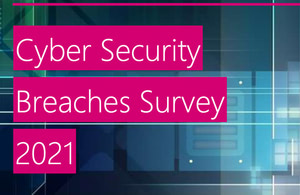Support for UK education sector after growth in cyber attacks

The National Cyber Security Centre (@NCSC) have issued an alert warning educational institutions about a significant increase in the number of attacks since late February, when establishments were preparing to welcome students back to the classroom.
There is no reason to suspect the same criminal actor has been behind each attack, which have caused varying levels of disruption, including targeting school financial records.
The news, which comes as the University of Northampton reports last week’s attack has left them “severely impacted”, is the latest sign of the growing threat posed by an increasingly large and sophisticated cybercrime industry.
The NCSC’s advice includes a number of practical steps which can be taken as part of a ‘defence in depth’ strategy, from installing and enabling antivirus software to having up-to-date and tested offline back-ups.
Paul Chichester, Director of Operations at the NCSC, said:
“Any targeting of the education sector by cyber criminals is completely unacceptable.
“This is a growing threat and we strongly encourage schools, colleges, and universities to act on our guidance and help ensure their students can continue their education uninterrupted.
“We are committed to ensuring the UK education sector is resilient against cyber threats, and have published practical resources to help establishments improve their cyber security and response to cyber incidents.”
Steve Kennett, executive director of e-infrastructure at the UK’s digital body for tertiary education, Jisc, said: said:
“Jisc has been helping many colleges and universities recover from ransomware attacks recently, so we have seen what a devastating impact this crime has on the sector.
“I urge all education and research institutions to act swiftly to ensure their systems and data are robustly protected.”
Often the aim of cyber criminals deploying ransomware is to encrypt data that will have the most impact on an organisation’s services. This can affect access to computer networks as well as services including email systems and websites.
The NCSC previously reported an increase in ransomware attacks on the UK education sector in August and September 2020, and has updated this alert in line with the latest activity.
Alongside the updated alert, network defenders are also urged to read the NCSC’s mitigating malware and ransomware guidance, and to plan and rehearse ransomware scenarios in the event that defences are breached.
Matt Bearpark, Head of Product for Connectivity and Online Safety at the provider of technology and resources to education sector RM plc, said:
“In recent months, RM has seen a marked increase in the number of malware infections in education establishments leading to ransomware demands that have led to some schools, universities and colleges being seriously impacted – losing access to key files and data, or being unable to teach for a period of time whilst systems are restored.
“We believe that in many cases these issues were avoidable, and we welcome the actions of the NCSC in alerting the sector to some of the precautions they can take – to both minimise the likelihood of such an attack, as well as to mitigate the impact that one may have upon their ongoing operation.
“Whilst a technology partner – such as RM – will always help to keep their customers’ technology systems and data safe, there are always new risks to stay aware of and potential vulnerabilities and fallibility in process and human behaviour.”
Adam Bangle, VP EMEA at BlackBerry
“The latest warning from the NCSC is yet another signal of the growing threat to the education sector posed by cybercrime and ransomware in particular. During this pandemic, we have seen a nearly 600% rise in malicious attacks worldwide targeting schools and universities, offices, government departments and hospitals. This reflects the growing number and sophistication of cyberattacks and ransomware over the last year, as shown in our latest 2021 Threat Report.
“To ensure the continuity of education, especially in the context of remote learning, we encourage the government to consider the impact on individuals’ wellbeing and ensure security, productivity and user experience. If these devices become infected with a virus or malware, they can expose sensitive personal information that students share during the learning process.
“This should be an alarm bell for the public sector, a demonstration of the need to secure each and every endpoint. Even the smallest chink in the nations digital armour could spell disaster.”
Businesses urged to act as two in five UK firms experience cyber attacks in the last year
Two in five businesses (39 per cent) and a quarter of charities (26 per cent) report having cyber security breaches or attacks in the last 12 months.
- New report suggests the cyber risk to organisations is heightened because of the pandemic
- Data shows fewer businesses are taking recommended cyber security measures
- Government urges organisations to follow expert guidance to boost their online resilience
Two in five businesses (39 per cent) and a quarter of charities (26 per cent) report having cyber security breaches or attacks in the last 12 months, according to new figures from the Department for Digital, Culture, Media and Sport (DCMS).
The Cyber Security Breaches Survey 2021 report also shows the cyber risk to organisations is heightened because of the pandemic, which has made securing digital environments more challenging as organisational resources are diverted to facilitating home working for staff.
The government is now encouraging businesses, charities and educational institutions to follow the free help and guidance from the UK cyber security experts at the National Cyber Security Centre (NCSC). It includes advice on the secure use of video conferencing, secure home working and how to move your business from physical to digital. This week the centre also published new guidance specifically to help educators boost their cyber resilience.
Digital Infrastructure Minister Matt Warman said:
The pandemic has taken an unavoidable toll on British businesses but we cannot let it disrupt our high cyber security standards.
With more people working remotely it is vital firms have the right protections in place, and I urge all organisations to follow the National Cyber Security Centre’s expert guidance so we can build back better and drive a new era of digital growth.
The new data shows fewer businesses are using security monitoring tools to identify abnormal activity which could indicate a breach – suggesting firms are less aware than before of the breaches and attacks staff are facing. The figure has dropped five per cent since last year to one in three firms (35 per cent). Only 83 per cent of businesses have up-to-date anti-virus software – also down five per cent from the previous year.
The most common breaches or attacks were phishing emails, followed by instances of others impersonating their organisation online, viruses or other malware including ransomware.
Where a breach has resulted in a loss of data or assets, the average cost of a cyber attack on a business is £8,460. This figure rises to £13,400 for medium and large businesses.
The figures also reveal nearly half of businesses (47 per cent) have staff using personal devices for work, but only 18 per cent have a cyber security policy on how to use those personal devices at work. Less than a quarter of businesses (23 per cent) have a cyber security policy covering home working.
Despite the challenges of the pandemic, cyber security remains a high priority for business leaders. More than three quarters (77 per cent) of businesses say cyber security is a high priority – up 12 per cent from the 2016 report.
The government is investing £1.9 billion in the National Cyber Security Strategy over five years to support a prosperous digital economy. This includes delivering a programme to improve businesses cyber resilience, set high industry standards and provide organisations with expert advice and guidance.
Earlier this month the Digital Secretary Oliver Dowden set out his ten tech priorities which included keeping the UK safe and secure online and the government last week published its groundbreaking Integrated Review of defence and security.
The review sets the goal of cementing the UK’s position as a responsible and democratic cyber power and announced a commitment to publish a new National Cyber Strategy later this year. The strategy will set out how the UK intends to build a more resilient digital nation and realise the benefits that cyberspace can bring.
DCMS is also reviewing what more the government can do to improve businesses’ resilience and cyber security, as well as progressing work to make sure consumer smart devices are more secure.
- The Cyber Security Breaches Survey is an Official Statistic and has been produced to the standards set out in the Code of Practice for Statistics.
- The Cyber Security Breaches Survey 2021 was carried out for DCMS by Ipsos MORI with the fieldwork conducted between October 2020 and January 2021.
- The annual Cyber Security Breaches Survey is part of the government’s National Cyber Security Strategy, which is investing £1.9 billion over five years to make the UK the safest place to live and work online.











Responses